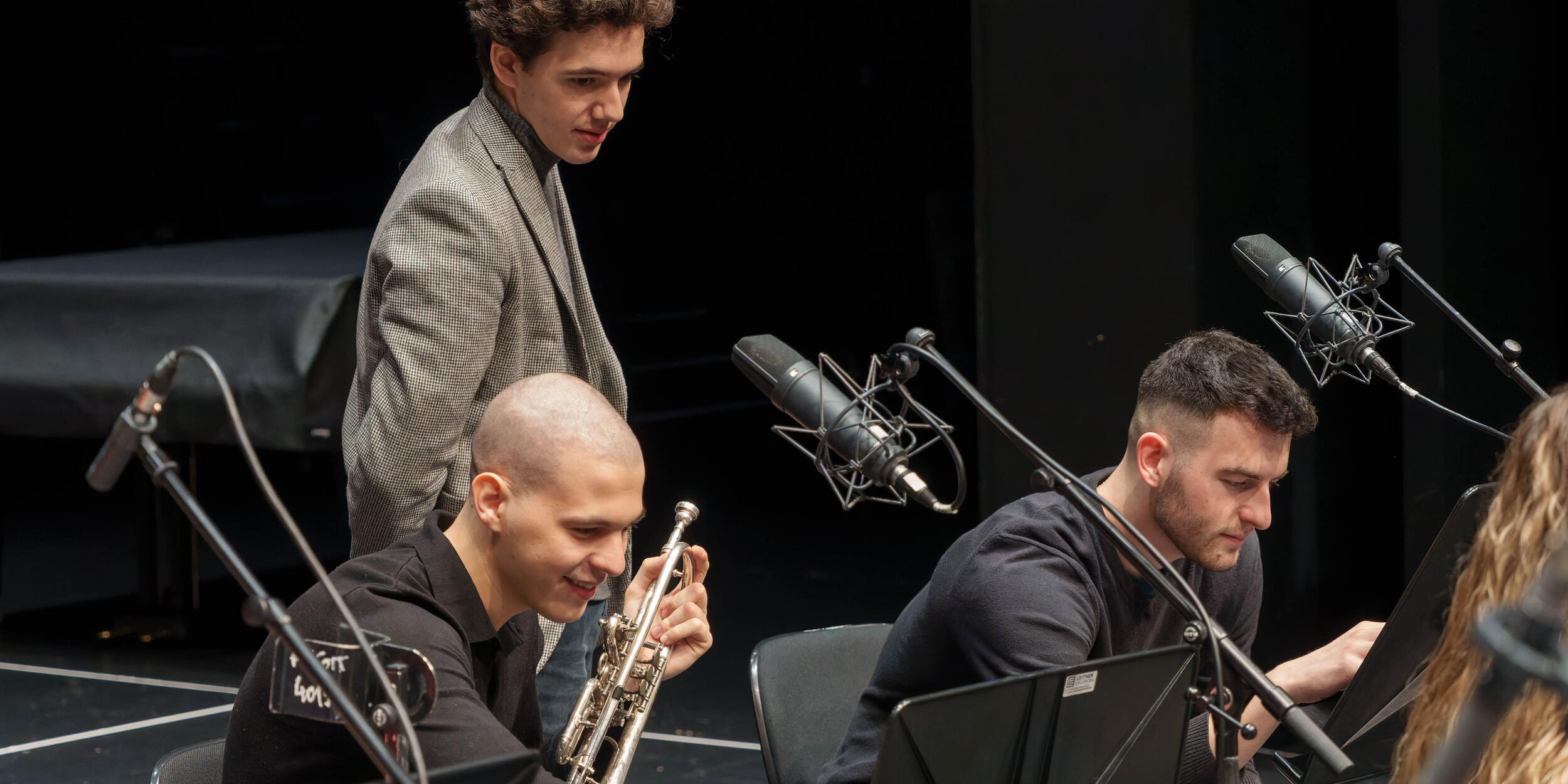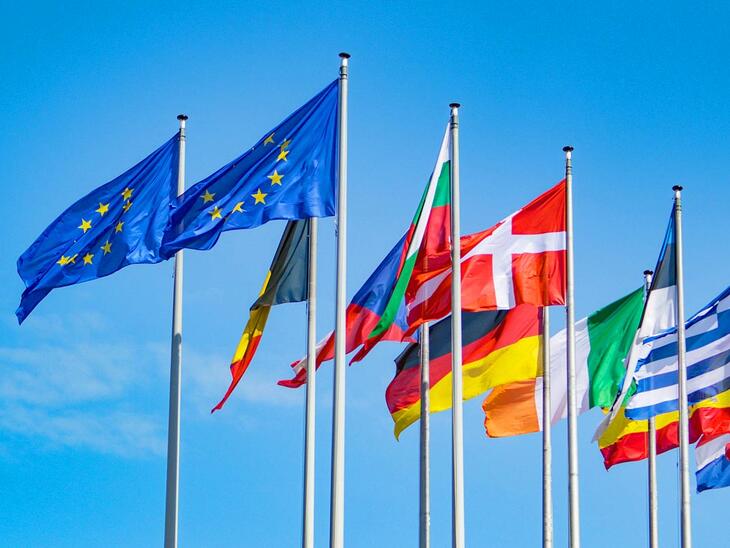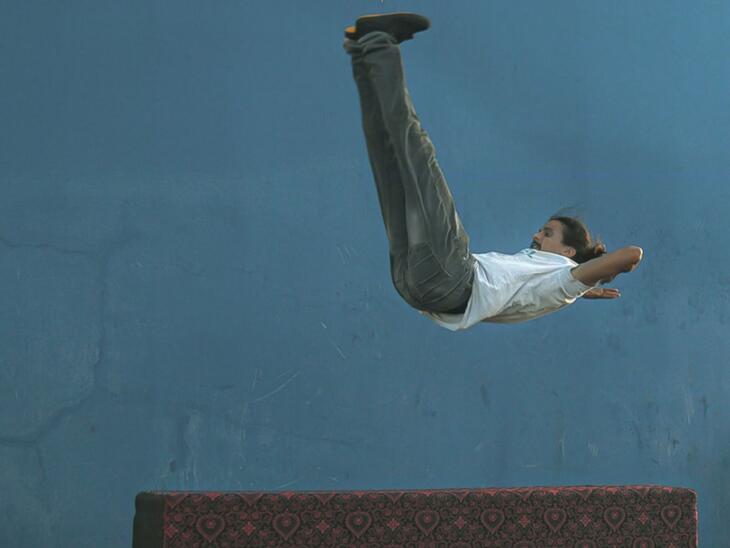International Relations

The Department of International Affairs is responsible for organising and coordinating international activities at the Mozarteum University. It is the service point for all members of the university who wish to spend time studying or teaching at a partner institution abroad, as well as for the incoming students and teachers we welcome for a guest stay at the Mozarteum. Our tasks include organising and facilitating international cooperations, cultivating relationships with foreign organisations, institutions and personalities, and opening the doors for mobility.
International Relations
+43 676 88122 418
+43 676 88122 336
international@moz.ac.at
Mirabellplatz 1
5020 Salzburg
Office: Schrannengasse 10a/ room 2012
Erasmus-Code:
A SALZBUR02
OID: E10093810
PIC: 949452879
Downloads
About
The Mozarteum University Salzburg maintains numerous cooperation agreements with various institutions worldwide, which run under the Erasmus+ scheme or operate as bilateral partnerships.
Erasmus+ is the most successful programme of the European Union in the field of education. The experience gained abroad is a valuable asset for both professional and personal development. Following a successful application to the European Commission, the Mozarteum University Salzburg was awarded the Erasmus Charter for Higher Education for the full period of the programme (2021-2027); the Mozarteum's "Erasmus Declaration on Higher Education Policy" can be read here. The charter entitles the holder to participate in all activities under the EU Erasmus+ programme, including participation in the mobility scheme for students and staff wishing to complete a teaching stint or professional development activity abroad.
Bilateral partnerships: The bilateral cooperation agreements that the Mozarteum University maintains with renowned institutions worldwide enable artistic exchanges in the form of cooperative projects or in the context of a study or teaching stay at a partner institution.
Erasmus+ Inclusion Support
It is important to us to open the doors to greater mobility for people regardless of their personal and social background. The Erasmus+ programme and the Mozarteum University want to promote inclusion, diversity and equal opportunities. People who wish to participate in the Erasmus+ programme (studying, teaching, professional development) are strongly encouraged to apply for an inclusion grant. We warmly invite any potential applicants to arrange a consultation with the staff of the International Affairs Department to discuss the options open to them.
- The application form for Erasmus+ inclusion support can be found under downloads
- Further information is available here: erasmusplus.at
- For details on accessibility and other support measures at European universities, see: https://inclusivemobility.eu
The new Erasmus+ programme generation (2021-2027) places a strong focus on sustainability, and thus promotes ‘green’ travel. Participants who use ‘green’, i.e. lower-emission, means of transport (e.g. train, bus, carpooling) for more than 50% of the total distance (outward and return journey) are entitled to a one-off lump-sum travel allowance known as the "Green Travel Top-Up".
Any parts of the trip completed by plane, motorbike or boat or travelling alone by car are considered ‘not green’.
Travel Advice
New Interrail Pass for Erasmus+
There is now a new Interrail Pass specifically designed for Erasmus participants! The two options of 4 or 6 travel days within six months make it particularly attractive for those completing semester stays. For just over €200 you can use 4 travel days flexibly within six months, or for €300 you can travel on six days within the same period.
Helpful websites for international travel connections include The Train Line Night Trains, where you can find a map giving an overview of night train lines in Europe. The Erasmus by Train initiative also provides tips for your travel planning and campaigns for a free Erasmus+ ticket.
Green Erasmus Portal
The Green Erasmus Portal was developed by the Green Erasmus project to provide students with concrete information on how they can act sustainably before, during and after their Erasmus stay. While some measures are common knowledge, other aspects are often overlooked and/or students are not fully aware of how to make their Erasmus stay more environmentally friendly. The portal provides valuable tips and tricks for sustainable action as well as useful resources for further information and how to get involved!
Sustainability
‘Climate-friendly travelling’ from the Federal Ministry for Climate Action, Environment, Energy, Mobility, Innovation and Technology contains information and suggestions with regard to mobility that can also be applied to your stay abroad.
Further information and advice are available at: international@moz.ac.at
Elective Studies in Interational Expertise
News
Fundings & Calls
Funding & Calles
Stand 14.6.2025
- Austrian Fulbright Scholar Program
Das österreichische Fulbright-Stipendiatenprogramm dient sowohl aufstrebenden als auch etablierten Wissenschaftlern. Es fördert die Karriere von österreichischen Wissenschaftlern am Anfang und in der Mitte ihrer Laufbahn, indem es ihnen die Möglichkeit bietet, an entscheidenden Punkten ihrer Laufbahn an Einrichtungen in den USA zu lehren und zu forschen.
Application Period: 15 February–30 October 2025
Grant Length: 4 months
Starting Date: 2026–27 academic year - Stipendien der bilateralen Aktionen
Die drei bilateralen Förderprogramme „Aktionen“ unterstützen Kooperationen und grenzüberschreitende Mobilität im tertiären Sektor zwischen Österreich und den drei Nachbarländern Slowakei, Tschechien und Ungarn. Im Mittelpunkt steht dabei die Förderung des wissenschaftlichen Nachwuchses. Je nach Aktion und Förderprogramm gibt es bis zu vier Ausschreibungen für Einreichungen pro Jahr mit unterschiedlichen Deadlines. Die Stipendienprogramme werden vom OeAD gefördert.
Einreichung: verschiedene Einreichfristen
- Erwin-Schrödinger-Programm (Postdoc-Programm)
Die Erweiterung des eigenen wissenschaftlichen Profils in einem neuen exzellenten Umfeld ist wesentlich für eine nachhaltige Karriereentwicklung. Ein Schlüssel zum Erfolg ist dabei die Mobilität: Das Erwin-Schrödinger-Programm ermöglicht hochqualifizierten Postdocs karrierefördernde Aufenthalte an international renommierten Forschungsstätten.
Einreichung: laufend möglich
Fördergeber: FWF - ESPRIT (Early-Stage Program: Research – Innovation – Training) (Postdoc-Programm)
Das Programm ESPRIT (Early-Stage Program: Research – Innovation – Training) dient der Kompetenzentwicklung und Karriereförderung von Forschenden aller Fachdisziplinen am Beginn ihrer wissenschaftlichen Karriere mittels Durchführung eines eigenständigen Forschungsprojekts
Einreichung: laufend möglich
Fördergeber: FWF
-
Grants.at
Österreichs größte Datenbank für Stipendien und Forschungsförderung für alle wissenschaftlichen Bereiche. Die Fördermöglichkeiten für Studierende, Graduierte und Forschende reichen von klassischen Stipendien über Zuschüsse und Preise bis hin zu umfassenden nationalen, europäischen und internationalen Forschungsförderungsprogrammen.
Student mobility: Erasmus+ for undergraduate and graduate students
With Erasmus+, students can spend up to twelve months per study cycle (BA, MA and PhD) at a partner institution in another European country. Courses taken abroad can be recognised for credits required by their degree programme at their home institution upon return.
Outgoing students
Incoming students
Student mobility within the framework of bilateral agreements
The Mozarteum University maintains exchange agreements with a number of selected international institutions, which enable student mobility within as well as outside of Europe.
Outgoing students
Faculty & General Staff Mobility
In order to support the internationalisation strategy of the University Mozarteum Salzburg and to improve the quality of teaching, university lecturers can receive financial support through Erasmus+ for teaching stints or further training at partner institutions abroad. Further education and training of general university staff can also be funded. There are funding opportunities for teaching and/or training stints in programme countries as well as in partner countries worldwide.
Insurance coverage: In the course of the application it is necessary to apply for a "Dienstreise AUSLAND" in the ASES as well as to enter the address of the destination, so that the corresponding insurance certificate for the mobility can be obtained on your behalf by the HR department.
You are advised to take out a cancellation travel insurance policy.
Partner institutions
General information
In times when Europeanisation, internationalisation and globalisation are more than just buzzwords, and a common European educational area with a broad range of courses and teaching content is increasingly becoming a reality, educational institutions are tasked with supporting and further expanding cooperation at both national and international level. The geographical location of the city of Salzburg places it at the intersection of north to south, and trade routes - suggesting the cultivation of contacts througout Europe - can be traced back historically to the 8th century.
The idea of connecting Europe has a centuries-old tradition in Salzburg. W.A. Mozart travelled from his home to cities such as London, Paris, Milan, Naples and Prague, thus giving Salzburg's musical life a European dimension, which was continued in the century after his death by music festivals held in loose succession and reached a new dimension with the founding of the Salzburg Festival in the 20th century. Salzburg has thus long been open to pan-European and international cultural exchange, a trend that has become every stronger over the decades and in recent years.
Internationality has also always played a significant role in the history of the Mozarteum University. Gifted young musicians of many different nationalities take advantage of the opportunity to study an institution that counts renowned artistic personalities from all over the world among its faculty. They are keen to share their skills and art with their protégés and, through their own commitment and worldwide activities as artists, educators or jurors, contribute significantly to furthering contact and cultural exchange with European and international institutions, fulfilling the mission of cooperation both within and outside the Erasmus+ programme.
Mobility is an inherent theme and characteristic within the world of music and art, the importance of which manifests itself in numerous fields of action of the university. The Mozarteum University Salzburg sees international mobility as a natural part of university life. Mobility experiences and studying abroad enable students, young researchers, teachers and non-academic staff to gain additional knowledge and competencies.
The University Mozarteum Salzburg is therefore very keen to consciously motivate students and teachers to participate in various mobility projects in order to make a stay abroad the norm. The Erasmus+ program enables our institution to cooperate with many European partners in the field of student and faculty mobility, which would not be possible to this extent without EU support. All students (regardless of social and economic background) should have access to quality education.
The new Erasmus+ programme generation will help the Mozarteum University Salzburg to create new incentives for participation in Erasmus+ mobilities (e.g. also for disadvantaged people). With the introduction of "blended mobility" and short-term mobilities, students who work alongside their studies to supplement their income will also have the opportunity to gain experience abroad. This opens up student mobility to an even wider target group at the Mozarteum University Salzburg.
Internationalisation strategy in relation to Erasmus+
Internationalisation at the Mozarteum University Salzburg is already very well developed. The 2000 or so students currently enrolled at the university come from five continents and around 70 countries. The approximately 550 teaching staff also come from a wide range of international backgrounds, with 38 different nationalities and three continents represented. The Mozarteum University Salzburg has risen from 32nd to 11th place in the international subject-related "QS World University Ranking" in the performance agreement period 2019-2021 (in 2018 it was still in 52nd place). Through numerous measures, it strives to continuously improve its international standing. For example, the International Summer Academy of the Mozarteum University Salzburg has earned a globally visible international reputation in its more than 100-year history, which is reflected in the high number of highly talented foreign applicants every year. The International Mozart Competition, which takes place every two years and whose final concert is regularly streamed by the Austrian Broadcasting Corporation (ORF), is firmly established in the league of top-class international music competitions.
In recent years, the Mozarteum University Salzburg has greatly increased its involvement in the relevant international networks and thus also assumes responsibility for the international shaping of the tertiary education sector in the field of the arts. Furthermore, the Development Plan 2022-2027 foresees the implementation of several international studies in order to further develop internationality in the field of teaching as well. The perspectives and strategic orientations of internationalisation are presented in detail in System Goal 6 of the GUEP 2022-2027, as well as in Chapter VI of the Development Plan 2022-2027 of the Mozarteum University Salzburg,
Closely intertwined with the development planning, the Mozarteum University Salzburg has formulated the following six objectives for its internationalisation strategy:
- International visibility and profiling of the university as a whole
- Further development of study formats
- Perception, discourse and co-design of international quality standards in research, EEK and teaching
- Mobility as a broadening of the horizon of experience for students and teachers
- Dialogue of cultures
- Internationalisation at home
The ERASMUS+ programme contributes to the realisation of these objectives. The topic of mobility in particular, but also the initiatives "Dialogue of Cultures" and "Internationalisation at Home" have experienced an additional strengthening through the programme, since mobility - as a bilateral exchange with partner institutions - also promotes internationalisation on site.
The Mozarteum University Salzburg would like to participate in the Erasmus Key Action 1 (KA1) - Learning Mobility. Known forms of mobility are to be continued and intensified as usual (study visits, Erasmus+ teacher mobilities and staff mobilities). The procedures are to be further digitalized step by step through the introduction of the Online Learning Agreement and the European Student Card. Through the new Erasmus generation, the University Mozarteum Salzburg can also further expand its existing cooperation projects with worldwide partners and launch new projects.
The University Mozarteum Salzburg aims to implement the priorities of the new program by:
- promoting environmentally friendly methods in all programme activities
- creating incentives for the participation of disadvantaged people
- implementing the program's digitisation measures
- promoting civic engagement before, during and after the stay
Goals and objectives
The University Mozarteum Salzburg has set the following mobility goals for the performance agreement period 2022-2024:
- Increase the number of regular students with participation in an international mobility program (outgoing students) as well as
- increase the number of regular students with participation in international mobility programs (incoming students)
In addition, short student mobilities are to be supported through the introduction of the Blended Intensive Programs in order to increase student mobilities at the university and to enable students to gain the important learning experiences abroad also through short stays. Through regular evaluation of the mobilities (student as well as staff mobilities), the quality of the mobility will be reviewed. The partnerships of the University Mozarteum will also continue to be evaluated regularly. An example of a concretely planned project in the area of mobility in the performance agreement period 2022-2024 is a project on artistic work in "being on the road" with the incentive of a travel grant including network support and presentation at an international Bob Dylan Symposium, which was implemented for the first time in 2022. To support and promote mobility, the International Affairs Department was strengthened and reorganized in 2021. The expansion of the regional mapping project to the area of international cooperation planned for the performance agreement period 2022-2024 is intended to support the servicing and orientation of mobility as well as the quality of international cooperation.
A project also supporting the area of mobility in the performance agreement period 2022-2024 is the planned relaunch of the website of the University Mozarteum Salzburg. This will be accompanied by a redesign of the "International Affairs" section, so that the information offered to students and teachers on mobility and exchange programs will be made more intuitively accessible.another objective in this performance agreement period is to promote the internationalization of teacher education and to increase the mobility of teacher educators.
In addition, the development plan 2022-2027 formulates as a major concern the conception of structural measures to promote project-related student mobility beyond ERASMUS. Further topics mentioned in this context are the development of mobility windows, the structural anchoring of cooperations, the special case of Brexit in the context of university mobility, and the quality management of international activities. In relation to the objective of "internationalization at home", the following measures at the study location are also formulated in the Development Plan 2022-2027 and in the Performance Agreement 2022-2024:
- Deepening the repertoire of a particular culture
- Multilingualism in performances
- Maintaining contact with consulates and embassies, arranging students for performances in order to realize joint cultural programs
- Special teaching offers and access to research results, e.g. in the research field "Music and Migration"
The Mozarteum University is a member of the following networks and organizations:
- AEC - Association Européenne des Conservatoires, Académies de Musique et Musikhochschulen
- Erasmus+ - Bildungsprogramm der Europäischen Union
- Nationalagentur Erasmus+ Bildung
- Bologna-Prozess
- ELIA - The European League of Institutes of the Arts
- EUA - European University Association
- Forum Internationales der Österreichischen Universitätenkonferenz
- OeAD - Österreichische Agentur für internationale Mobilität und Kooperation in Bildung, Wissenschaft und Forschung
- ASEA-UNINET - ASEAN-European Academic University Network
- EURASIA PACIFIC UNINET
- Mitos21
- E:UTSA
- European Platform for Artistic Research in Music (EPARM)
- European Textile Network (ETN)
- Salzburger Hochschulkonferenz (SHK)


